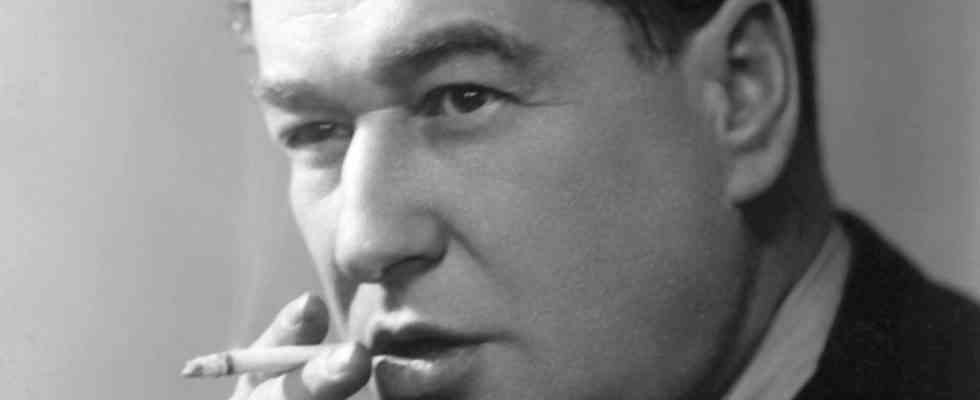Frenzied reporter
Egon Erwin Kisch died 75 years ago
The “mad reporter” Egon Erwin Kisch died on March 31, 1948 in Prague. photo
© CTK/dpa
His reportage volumes have lost none of their fascination to this day. Egon Erwin Kisch became a legend during his lifetime. The National Socialists persecuted him – as a Jew and a communist.
The “frenzied reporter” flies in a military plane over the lagoon city of Venice. “Tiny bristle hairs on the edge of the Riva degli Schiavoni are peaceful gondolas, acquaintances from bygone times,” he notes. Another time he mingles in disguise with the poorest in a London slum: “My costume seemed almost excessively tattered when I put it on.” And in Austria he is there when a serial burglar is gunned down.
The “mad reporter” – that’s Egon Erwin Kisch, who died 75 years ago, on March 31, 1948, in Prague. The legendary journalist and writer was only 62 years old – and yet he experienced more than many others. As a reporter in Prague, Berlin and Vienna, Kisch, who came from a German-speaking Jewish family, elevated reporting to the rank of literature.
mediocre student
The house in which Kisch was born on April 29, 1885 can be found on a small side street in Prague’s Old Town. Many tourists pass by the beautiful Renaissance building “At the Two Golden Bears”. You are on your way to the nearby Prague Astronomical Clock. A commemorative plaque on the corner of today’s Melantrich and Kozna streets commemorates Kisch, who spent his childhood here with four brothers. His parents ran a cloth shop on the ground floor.
In the secondary school, Kisch was only considered a mediocre student, but he published his first poems early on. He used the pseudonym “Erwin” for this, because the school management had forbidden it to be published. It became his middle name. Kisch briefly attended a journalism school in Berlin, later he immersed himself as a reporter for the newspaper “Bohemia” in Prague’s underworld, which offered him almost inexhaustible material.
In the engine room of the “Vaterland”
The final breakthrough came with a spy affair. The intelligence officer Alfred Redl was convicted of betraying secrets to Russia in Prague, which was then part of Austria-Hungary. He took his own life. The authorities wanted to cover up the scandal, but Kisch caught on to them. To circumvent censorship, he cleverly published his report in the form of an alleged official denial by the authorities.
Reading through Kisch’s reportage volumes today sometimes rubs one’s eyes. Can he really have experienced this himself? How does the man from Prague get into the engine room of the transatlantic liner “Fatherland” with its 46 steam boilers? A new biography by Christian Buckard, which was published by Berlin Verlag on the 75th anniversary of Kisch’s death, provides the answers. In it, the author meticulously traces the “world history of the frenzied reporter”.
And so we learn that in 1914 Kisch, along with other press representatives, was invited to the maiden voyage of the “Fatherland” from Hamburg to Southampton. The fact that he does not describe the luxury on board in his report, but instead focuses on the toiling heaters, is characteristic of the socially committed Kisch. After the First World War, he briefly headed the “Red Guard”. He later became a communist and supported the Soviet dictator Joseph Stalin until his death.
knowledge of self and the world
It’s no secret that Kisch sometimes tended to exaggerate and didn’t always take the truth very seriously. “In Kisch’s view, perhaps not everything had to be correct word for word,” writes his biographer Buckard, “but ultimately everything had to be truthful.” So maybe Kisch was more of a writer than a journalist after all. The coffee house favorite preferred to tell his stories in front of an audience. “The narrative and explanatory everyday actor Kisch, that was theater as an entertaining royal road to self-knowledge and world knowledge,” writes his biographer.
Buckard specifically explores the role of Kisch’s identity as a Jew in his life. He was certainly not a Zionist who saw his future in Israel – but he did not reject Zionism either. He fled to Mexico to escape the Nazis. When Kisch returned after the Holocaust, his Jewish Prague no longer existed. Once he revealed: “I didn’t see the Jewish half of my friends anymore, but got more news about the fate of these absentees than I would have liked. It was a “Wailing Wall” here in the apartment.”

